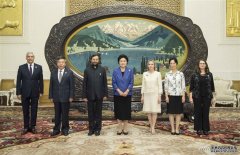Interview: Educational reform essential to Mexico's future:
MEXICO CITY, July 11 (Xinhua) -- Mexico is in dire need of an educational reform to bring about several changes, including in regular testing and supervision of teachers, to improve the efficiency of its school system, experts said.
Angel Diaz-Barriga, an emeritus researcher on higher education at the National Autonomous University of Mexico (UNAM), told Xinhua that evaluating the development of teachers is necessary, although the current method suggested by the government's reform is not adequate.
"Such inspections could be carried out through observations in class and would allow teachers to self-improve, while also recording classes for later examination," he suggested.
These planned evaluations, however, drew protests from teachers belonging to the National Coordination of Education Workers (CNTE). They are demanding the cancellation of the reform, which they see as punitive and opening the door to mass firings.
The Ministry of Public Education (SEP) has denied the allegation, saying that the reform does not aim to fire anyone but simply to ensure better results by training teachers.
Diaz-Barriga has his doubts as exams of teachers not affiliated with the CNTE in 2015 have not yet concluded. This leads him to believe the process, as designed by the current reform, is too long and does not really track the development of teachers in class.
"The teachers are complaining about all the evaluation processes, not just one," he said.
According to SEP, the evaluation process would consider four aspects, the opinion of the school director, the teacher's communications ability to students, a written exam, and oral and written evaluation of class planning ability.
This week, the SEP has begun a dialogue with teachers' unions to analyze problems in the reform and discuss how to improve its implementation.
"The vision of the evaluation will have to be changed to consider and utilize the teachers' opinions," Diaz-Barriga added.
Dissident teachers have been opposing the reform since it first emerged in 2013. However, since May, they have increased their protests, suspending classes and blocking off highways in the states of Oaxaca, Chiapas, Guerrero and Michoacan, where sentiment against the reform is particularly strong.
Hugo Casanova, an investigator at UNAM, told Xinhua that while the reform had "structural errors", an overhaul of teacher training and evaluation was bitterly needed.
According to Casanova, Mexico has around 5 million illiterate people and 32 million people who did not complete primary or secondary education.
"This is not just about making the CNTE happy or not, it is a matter of getting a reform that will help resolve deep structural problems," Casanova warned.















